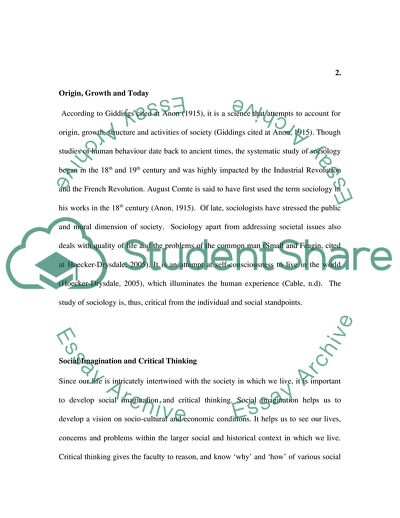
- Home
- Free Samples
- Premium Essays
- Editing Services
- Extra Tools
- Essay Writing Help
- About Us
- Studentshare
- Subjects
- Miscellaneous
- Define the meaning of Sociology. How might the study of this subject be useful towards understanding your place in society as an individual/citizen and as a soc
Define the meaning of Sociology. How might the study of this subject be useful towards understanding your place in society as an individual/citizen and as a soc - Essay Example

- Subject: Miscellaneous
- Type: Essay
- Level: Undergraduate
- Pages: 4 (1000 words)
- Downloads: 0
- Author: quintenlittle
Extract of sample "Define the meaning of Sociology. How might the study of this subject be useful towards understanding your place in society as an individual/citizen and as a soc"
ial interaction (Rex, 1974), a study of forms of cooperation (Durkheim and Parsons, cited at Rex, 1974), and our own behaviour as social beings (Giddens, and Griffiths, 2006). As science of society, sociology typically answers the questions like what is human nature, and why society is structured like this. The scope of sociology is extremely wide, ranging from the analysis of passing encounters between individuals in the street up to the investigation of world-wide social processes (Giddens and Griffiths, 2006).
Sociology helps us to develop a sound perspective on structures and institutions of society and thus helps us draw inferences from patterns in social relations and cultures. According to Giddings cited at Anon (1915), it is a science that attempts to account for origin, growth, structure and activities of society (Giddings cited at Anon, 1915). Though studies of human behaviour date back to ancient times, the systematic study of sociology began in the 18th and 19th century and was highly impacted by the Industrial Revolution and the French Revolution.
August Comte is said to have first used the term sociology in his works in the 18th century (Anon, 1915). Of late, sociologists have stressed the public and moral dimension of society. Sociology apart from addressing societal issues also deals with quality of life and the problems of the common man (Small and Feagin, cited at Hoecker-Drysdale, 2005). It is an attempt at self-consciousness to live in the world (Hoecker-Drysdale, 2005), which illuminates the human experience (Cable, n.d). The study of sociology is, thus, critical from the individual and social standpoints.
Since our life is intricately intertwined with the society in which we live, it is important to develop social imagination and critical thinking. Social imagination helps us to develop a vision on socio-cultural and economic conditions. It helps us to see our lives, concerns and problems within the larger social and historical context in
...Download file to see next pages Read MoreCHECK THESE SAMPLES OF Define the meaning of Sociology. How might the study of this subject be useful towards understanding your place in society as an individual/citizen and as a soc
Saudi Airlines and the Privatisation Issues
Involvement of Parents in Early Years Setting
Meaning of Sociology
Factors affecting Key Skills Achievements in Further Education
Health and Safety in Childcare
The Psychology of Terrorism
Opportunities and Challenges in Chinas Emerging Market under Globalisation
Marriages in Muslim Families

- TERMS & CONDITIONS
- PRIVACY POLICY
- COOKIES POLICY